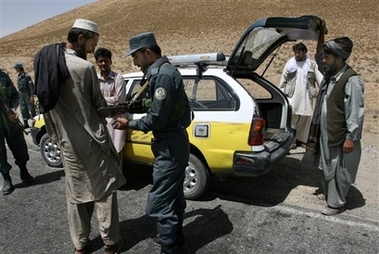Fate of Taliban hostages in dispute
(AP)Updated: 2007-07-22 08:42
KABUL, Afghanistan - A purported Taliban spokesman said Saturday that the Islamic militia had killed two German hostages, a claim disputed by both Afghanistan and Germany. He also offered to trade 23 captive South Koreans for imprisoned Taliban fighters.
"Everything indicates he was a victim of the stress of the kidnapping," German Foreign Minister Frank-Walter Steinmeier said in Berlin.
Despite the competing claims, the separate seizures of the foreigners in southern provinces were vivid illustrations of the lack of government control over the region.
Qari Yousuf Ahmadi, who claims to speak for the Taliban, said the Afghan and South Korean governments had until Sunday evening to agree to release 23 Taliban militants or the Korean hostages would be killed.
"If the government of Afghanistan and the government of Korea are asking for the release of their hostages, then we believe the Taliban also have the right to ask for the release of their prisoners who are spending time in Afghan jails," Ahmadi told The Associated Press by satellite phone from an undisclosed location.
It is not clear that Afghanistan would agree to such a deal. In March, President Hamid Karzai authorized the release of five Taliban prisoners in exchange for a kidnapped Italian reporter, but he called the trade a one-time deal. Karzai was also criticized by the United States and European nations who felt that trade would encourage more kidnappings.
Ahmadi claimed the Germans and five Afghans kidnapped along with them were shot to death because Germany did not withdraw its 3,000 troops from Afghanistan as demanded by the Taliban. The seven were kidnapped Wednesday in the southern province of Wardak while working on a dam project.
The Afghan government said it had information to the contrary.
"The information that we and our security forces have is that one of these two who were kidnapped died of a heart attack," Foreign Ministry spokesman Sultan Ahmad Baheen said. "The second hostage is alive, and we hope that he will be released soon, and we are trying our best to get him released."
He did not reveal the source of the information or say anything about the Afghan hostages.
The South Koreans were kidnapped at gunpoint from a bus Thursday in Ghazni province as they traveled on the main highway from Kabul to the southern city of Kandahar. It was the largest-scale abduction of foreigners since the fall of the Taliban regime in 2001.
The Taliban roam freely through large swaths of southern Afghanistan. The South Koreans' bus was stopped on Highway 1, a road known to be risky, particularly Ghazni and Zabul provinces where the government has little control.
Ahmadi initially said there were 18 South Korean hostages, but later revised the figure to 23, saying several Koreans spoke Dari and Pashtu and had been mistaken for Afghans. Ahmadi also initially said the kidnapped Koreans, including 18 women, would be killed Saturday if South Korea didn't withdraw its 200 troops. Late Saturday he changed that demand.
South Korean President Roh Moo-hyun urged the Taliban to "send our people home quickly and safely." Roh also spoke with Karzai and asked for his cooperation to quickly win the hostages' release.
UN Secretary-General Ban Ki-moon, himself a South Korean, also called Karzai and expressed "grave concern" over the abductions.
It was unclear what the Koreans were doing in Afghanistan. The Yonhap news agency reported that most were members of the Saemmul Community Church in Bundang, just south of Seoul. A year ago, hundreds of South Korean Christians were ordered to leave Afghanistan amid rumors they were proselytizing in the deeply conservative Islamic nation.
Ahmadi warned the Afghan government and US and NATO forces not to try to rescue the hostages or they would be killed.
"We have surrounded the area but are working very carefully. We don't want them to be killed," said Ali Shah Ahmadzai, the provincial police chief in Ghazni.
German Foreign Ministry spokesman Martin Jeager, meanwhile, said a crisis team was pursuing "every clue" and was in close contact with the Afghan government.
Germany has 3,000 soldiers in NATO's International Security Assistance Force who are stationed in the mostly peaceful northern part of Afghanistan. South Korea's 200 soldiers in the US-led coalition largely work on humanitarian projects, such as medical assistance and reconstruction.
In South Korea, family members of kidnapped victims urged the government to accept Taliban trade, noting Seoul had already decided to bring its soldiers home this year.
"We hope that the immediate withdrawal (of troops) is made," Cha Sung-min, a relative of one of the hostages, told reporters.
|
|
|
||
|
||
|
|

